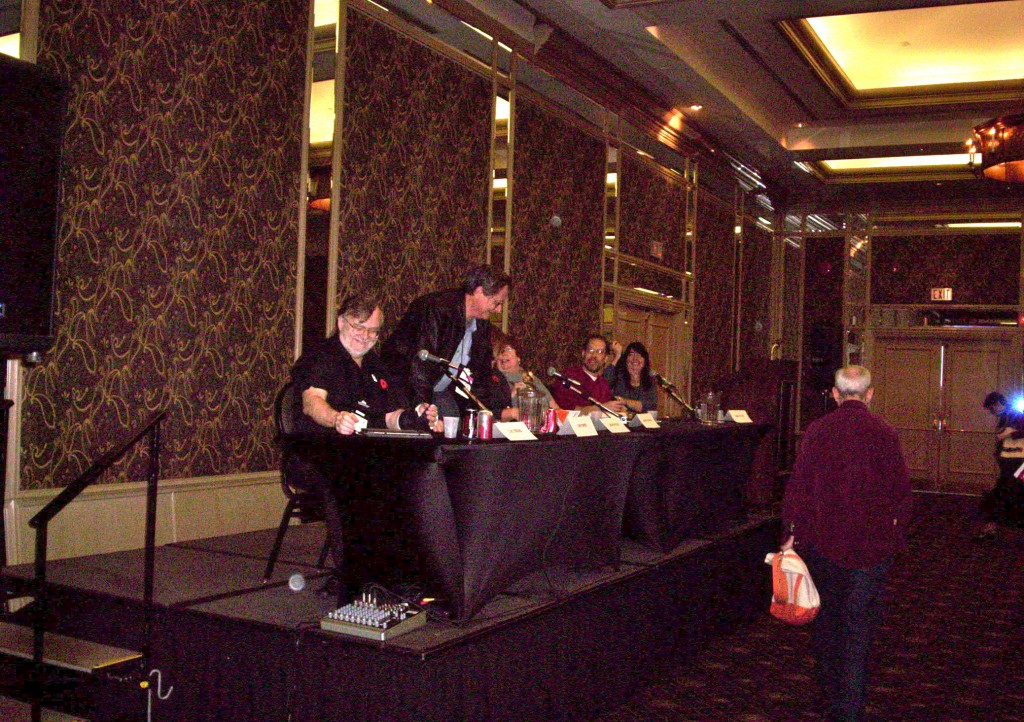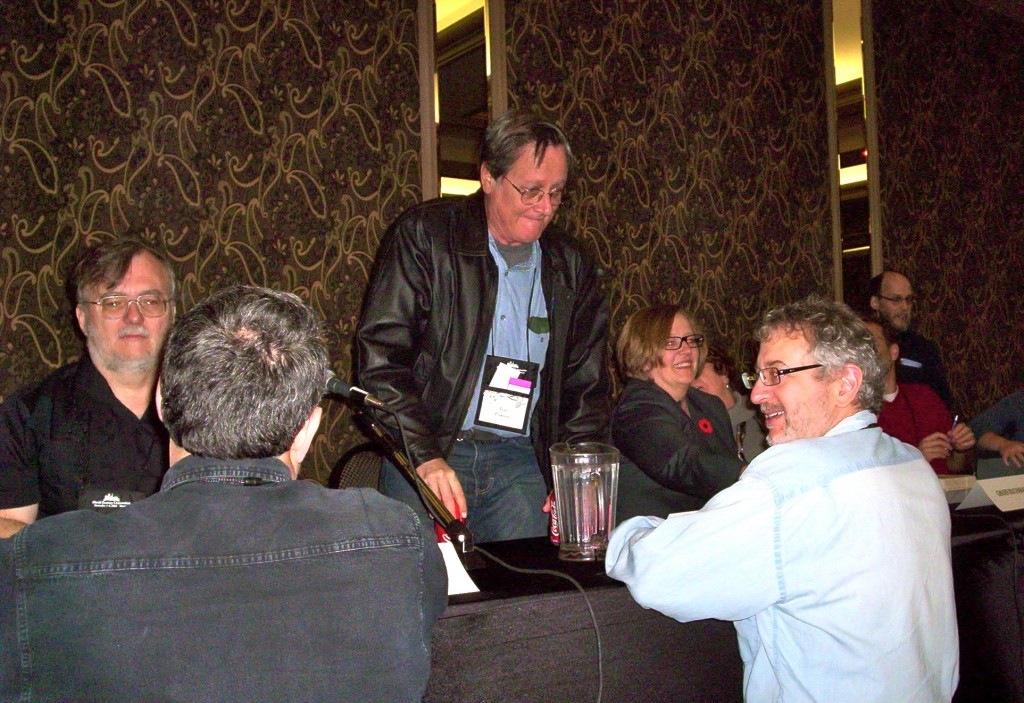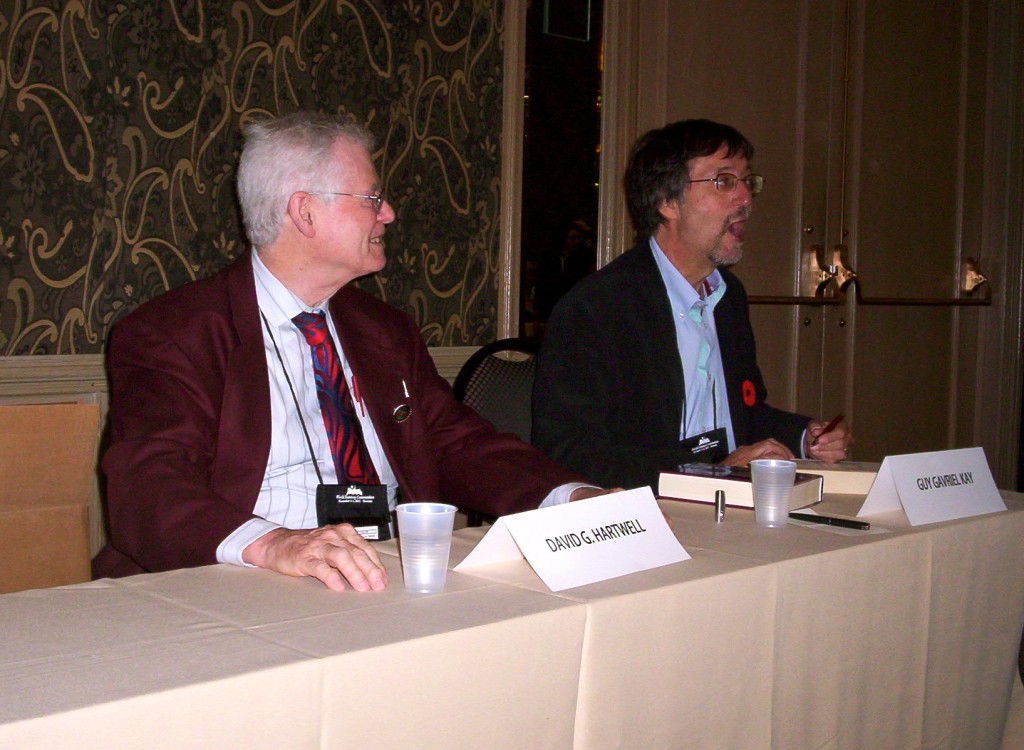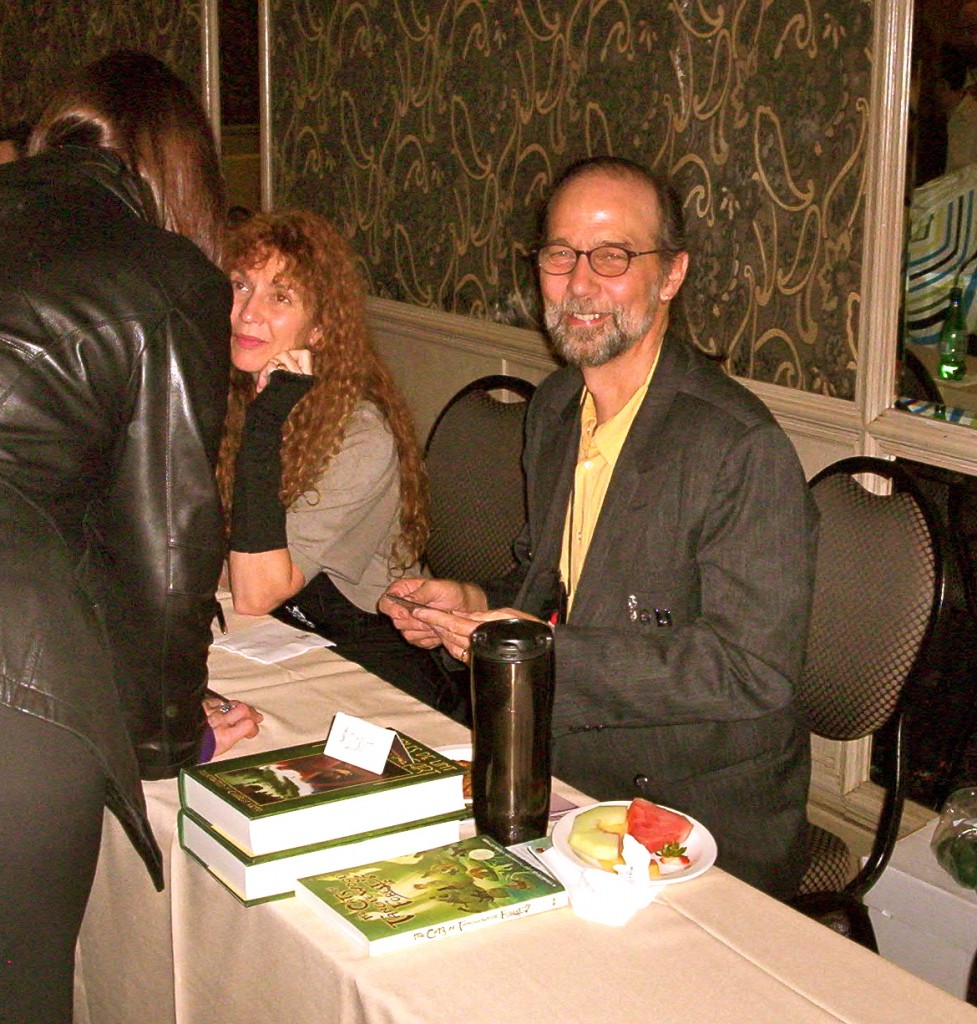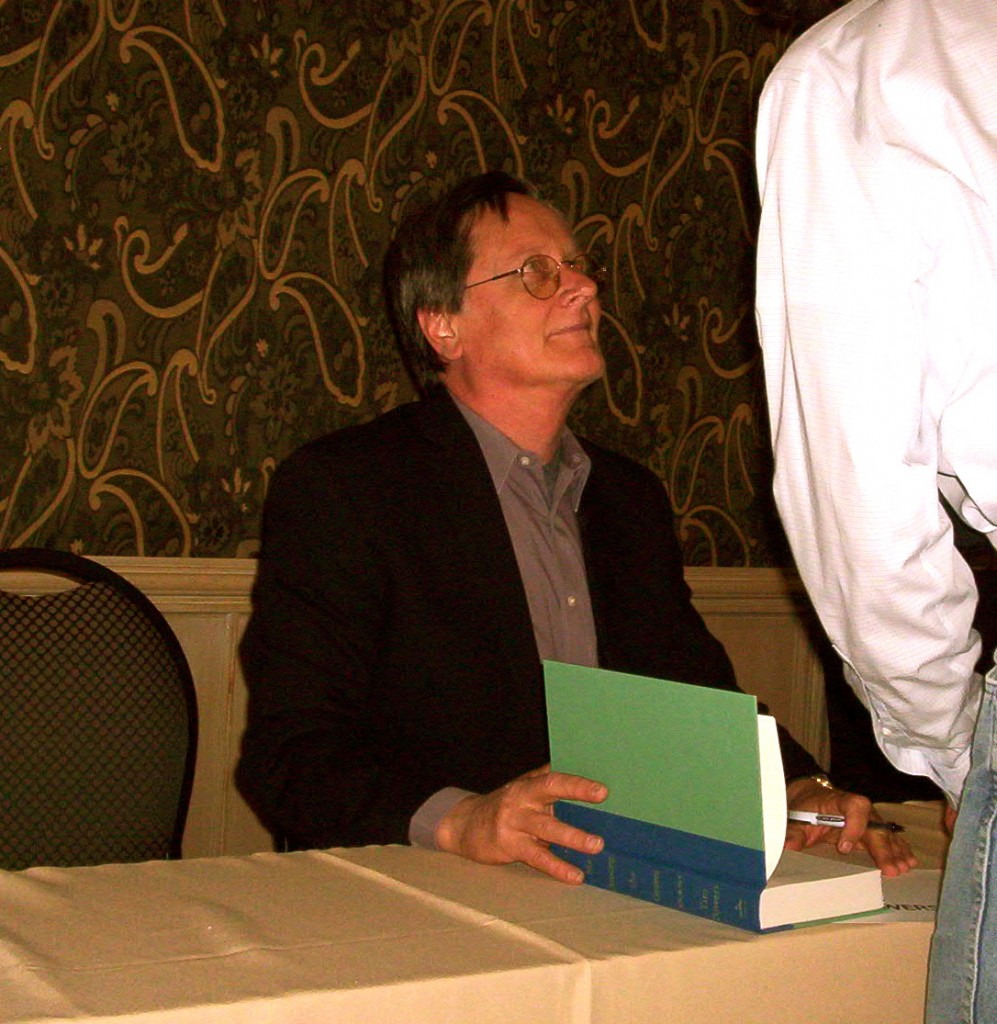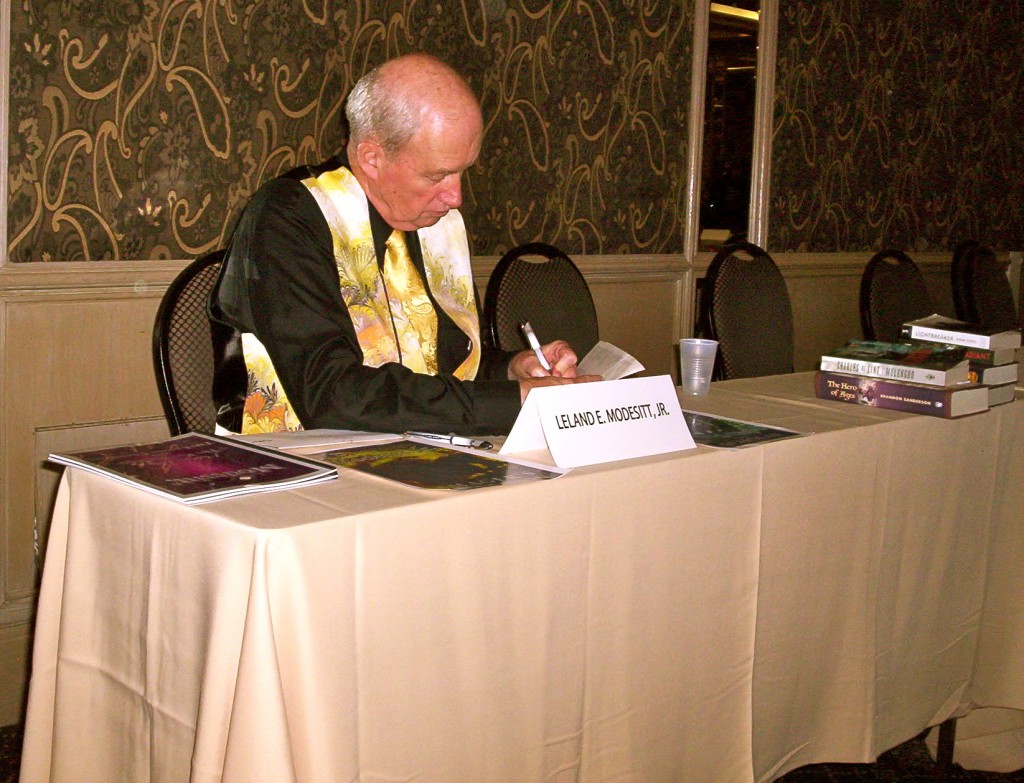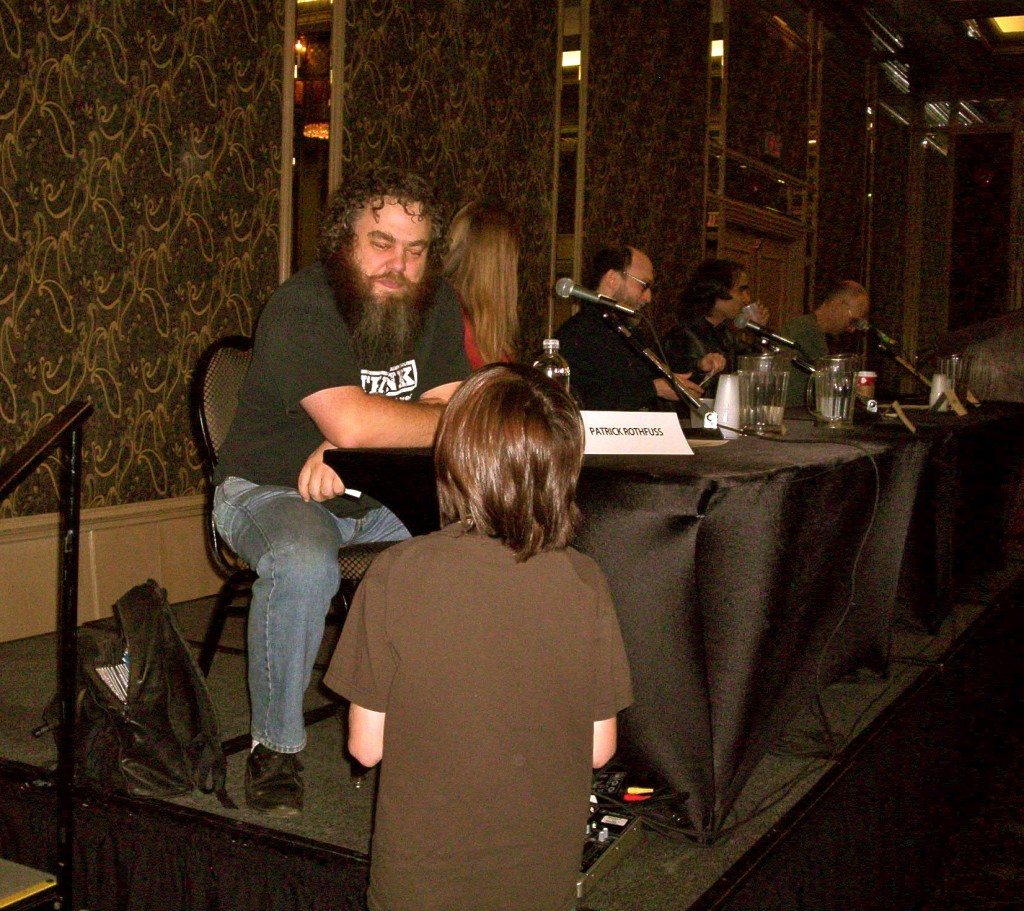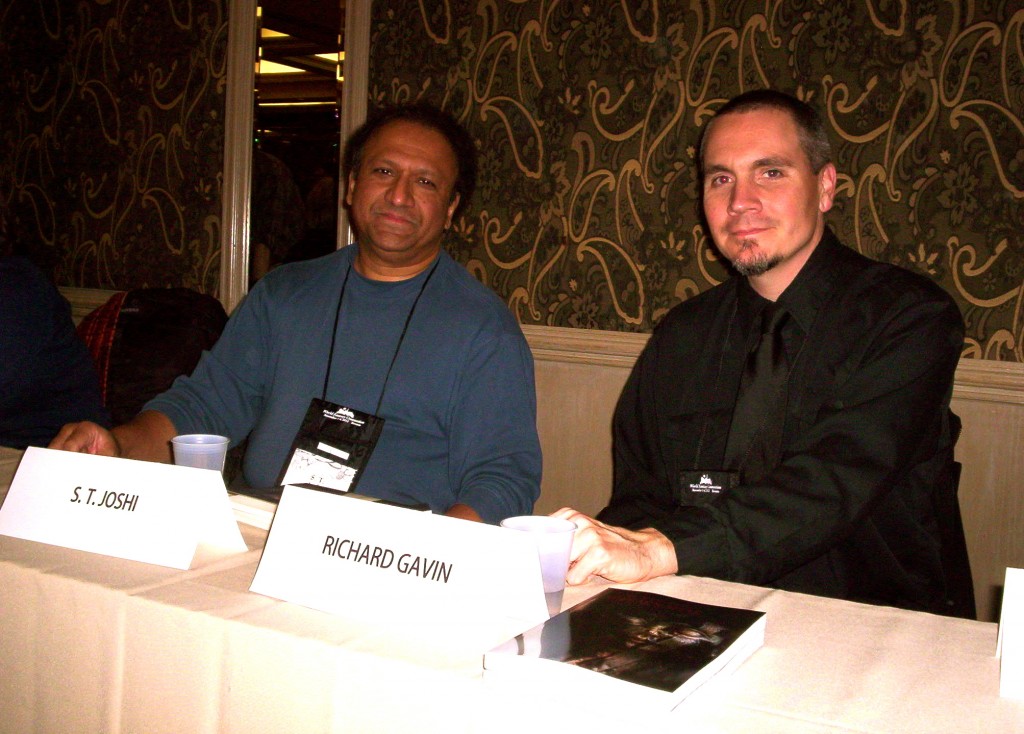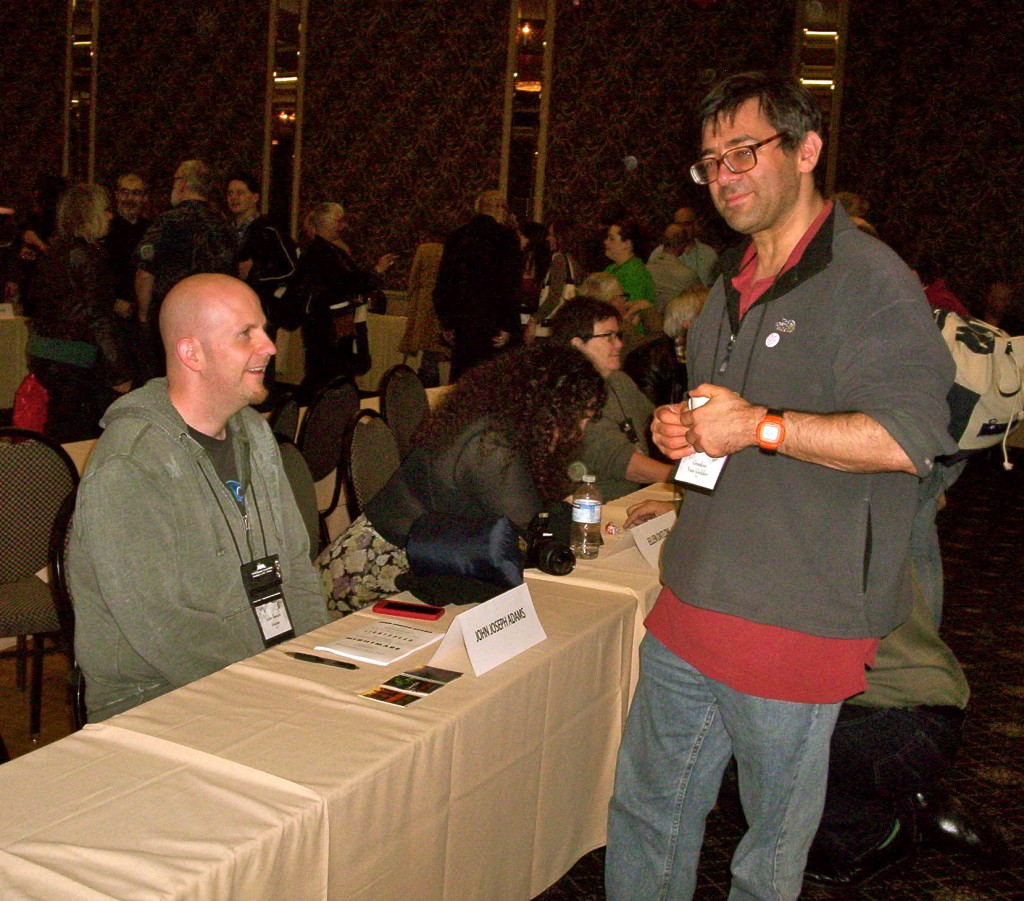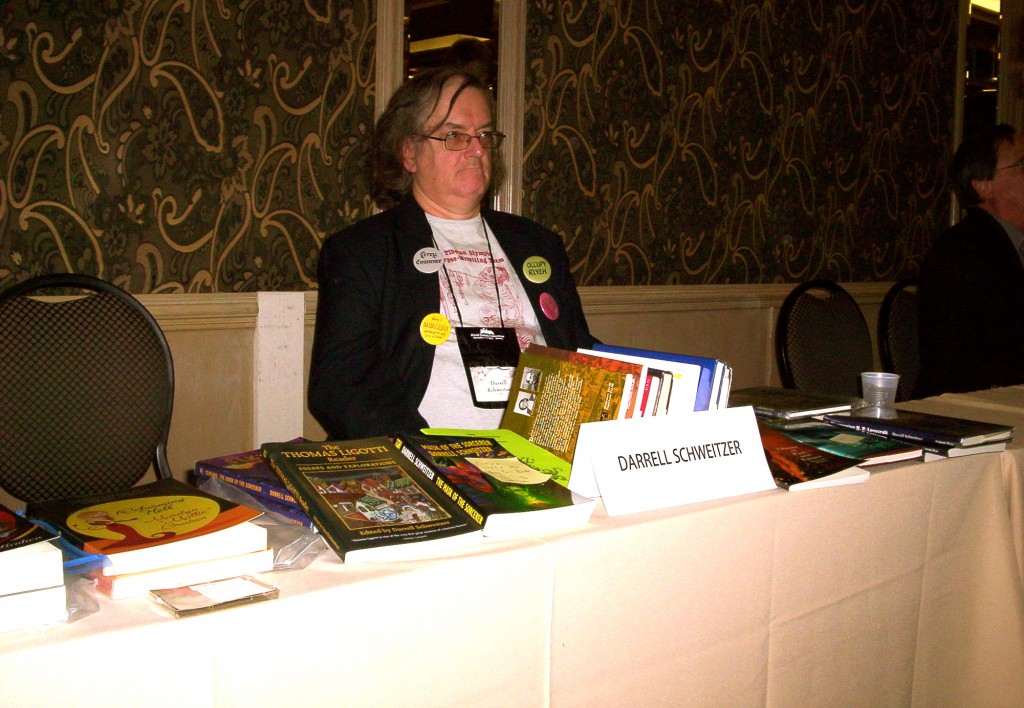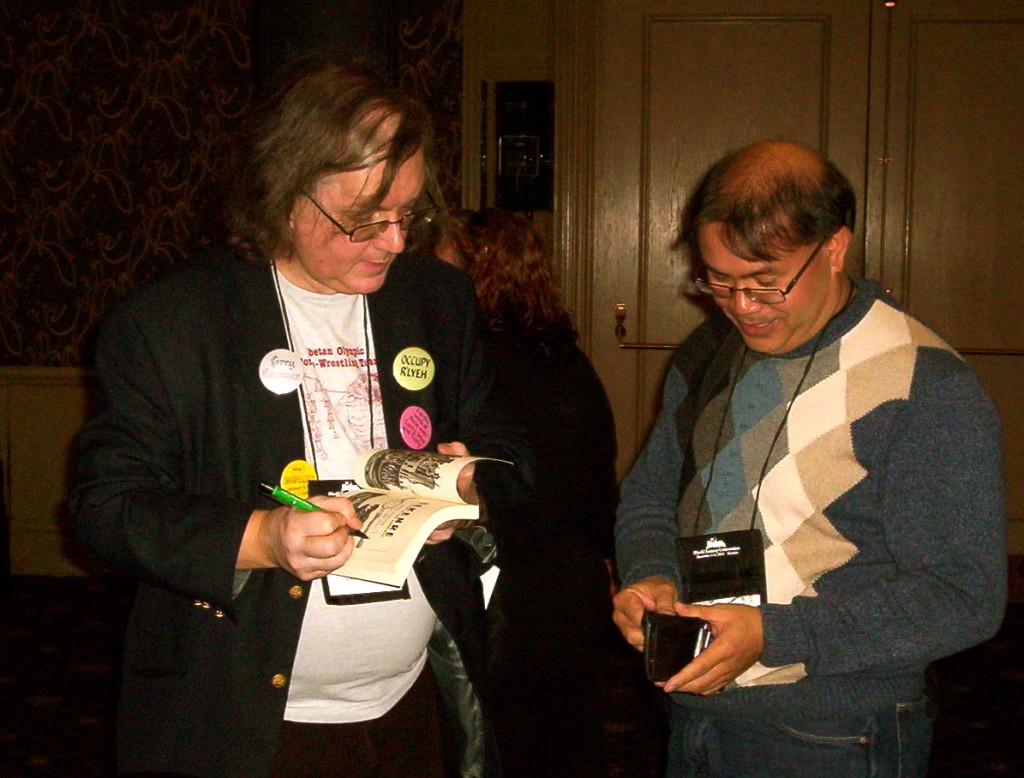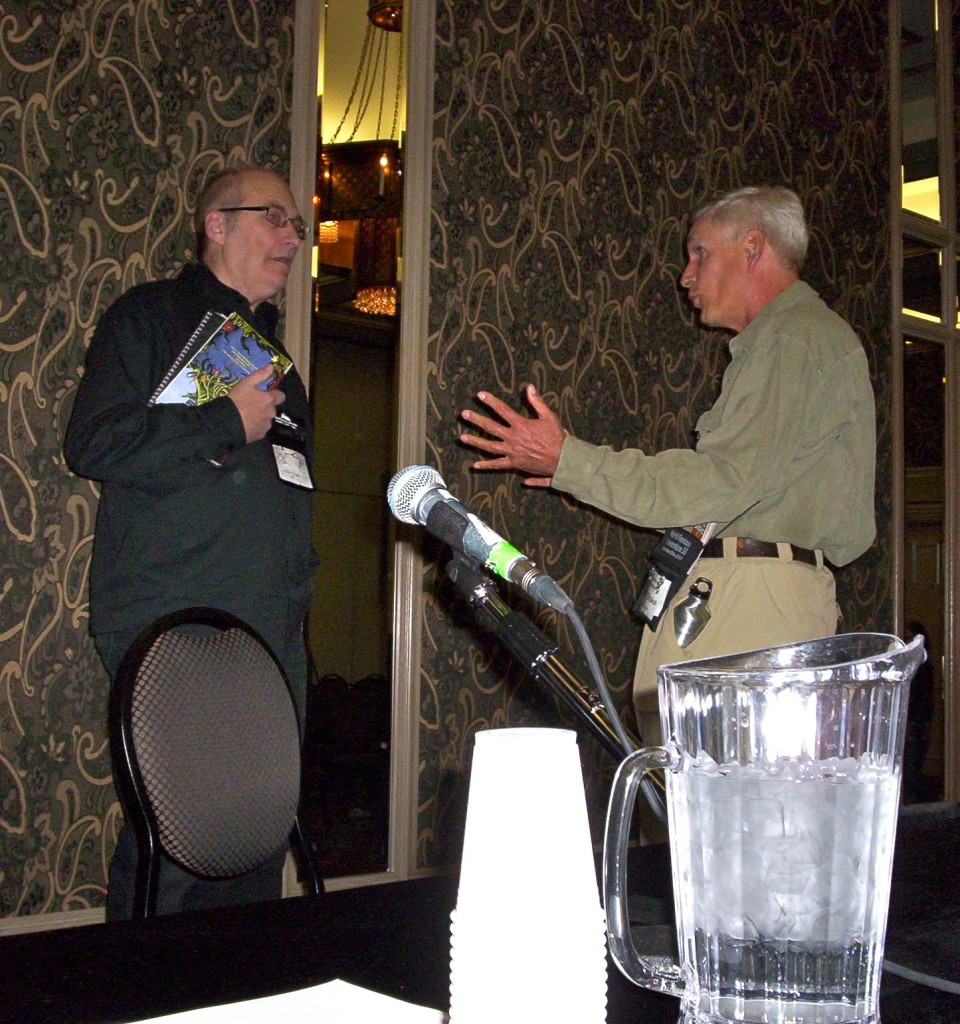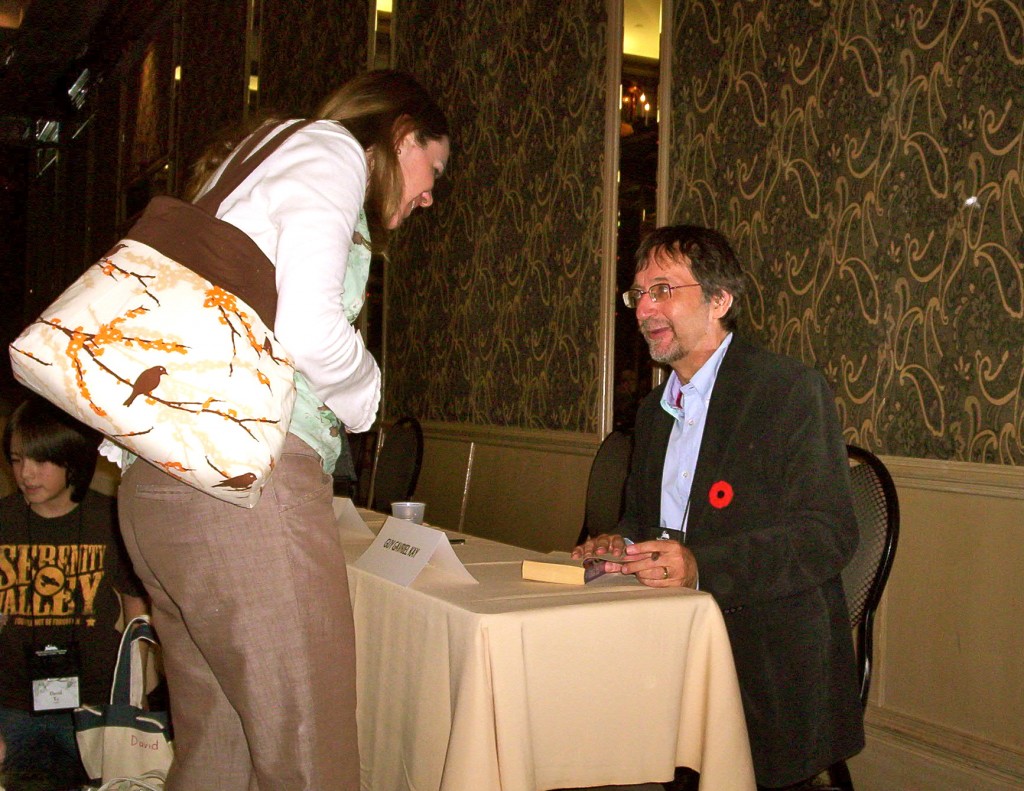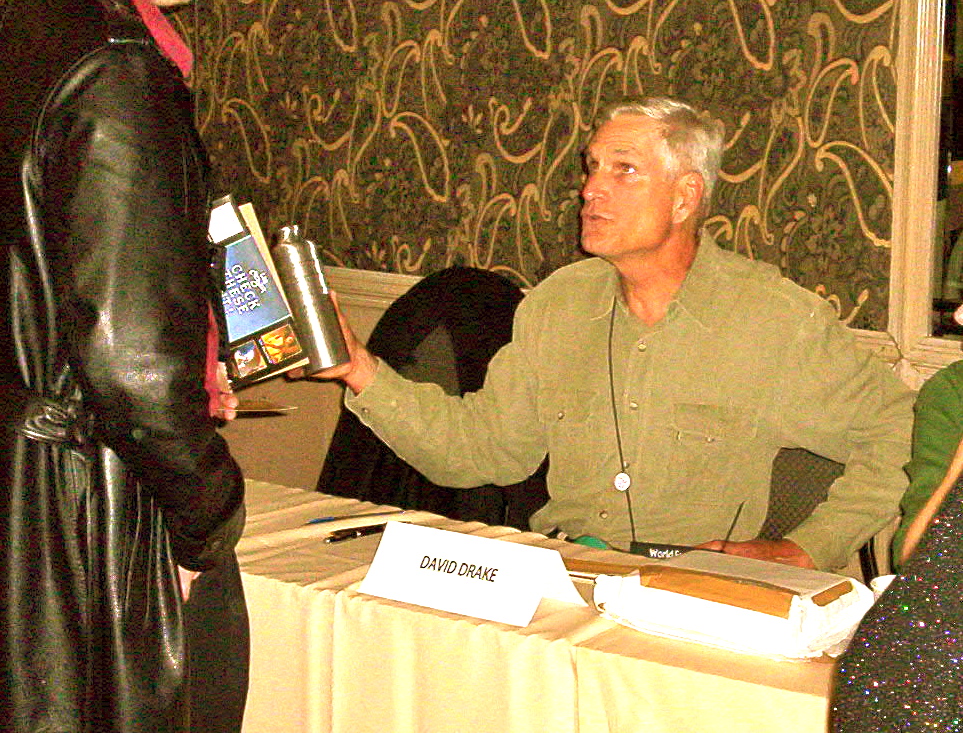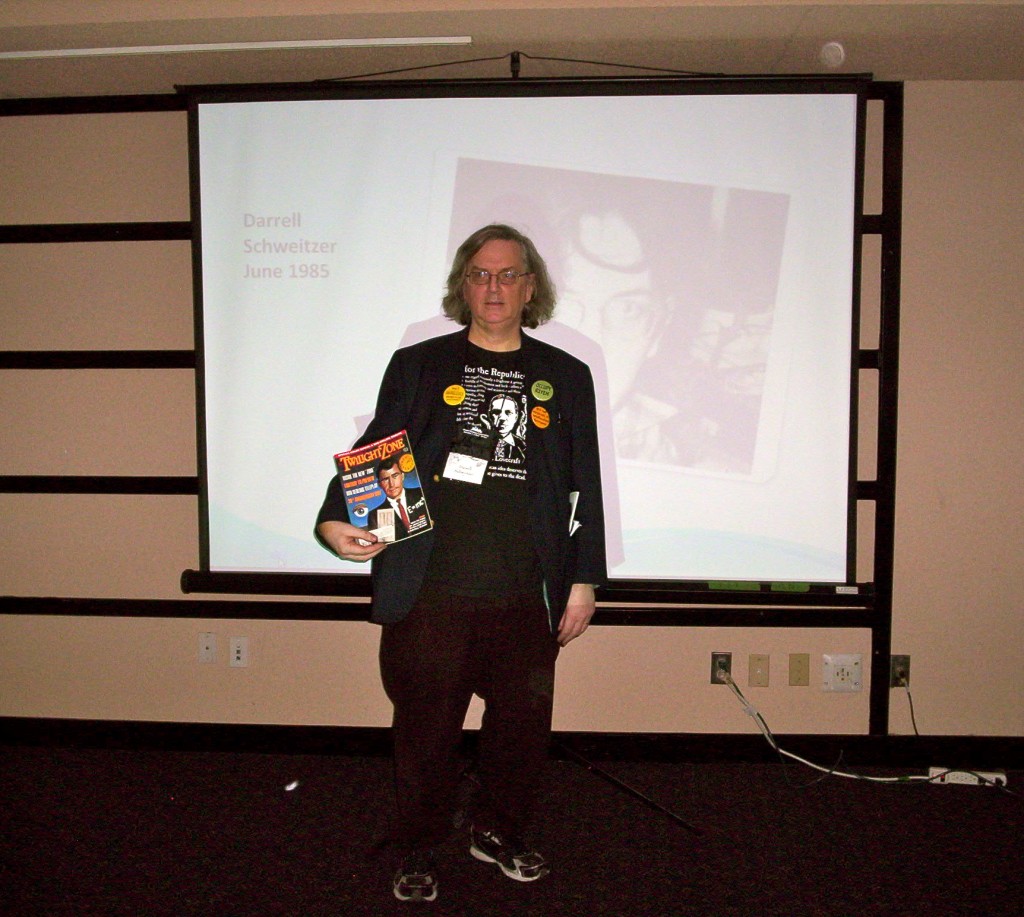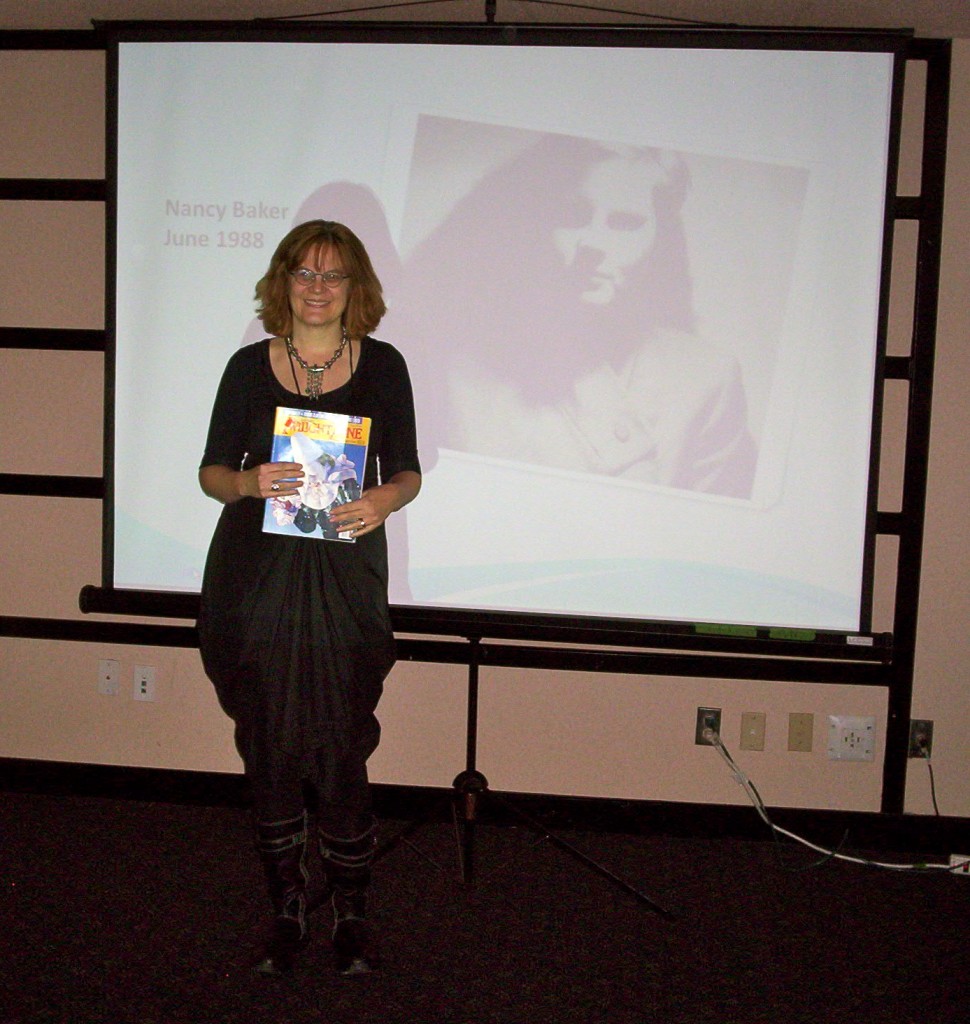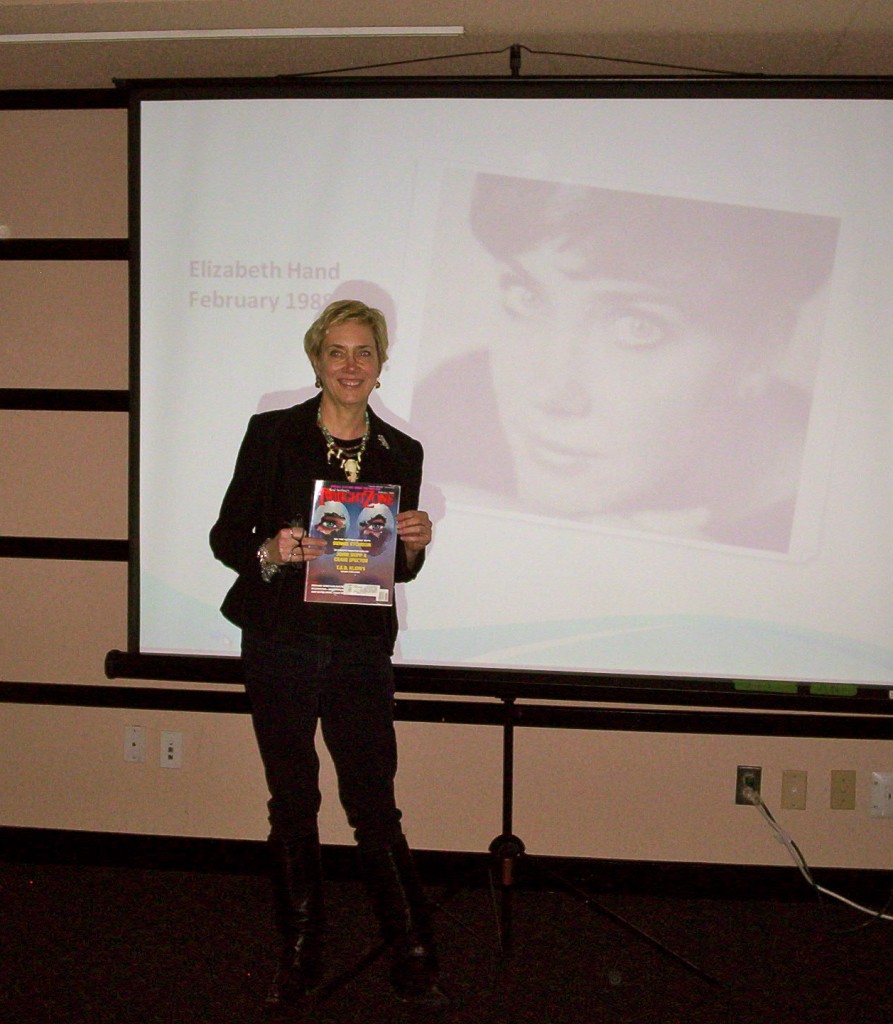I am safely back from the World Fantasy Convention, held this year in Toronto. Well . . . near Toronto. Well . . . not too far away from Toronto. I was told by a local attendee that, from the top of the convention hotel, you could in fact see the lights of Toronto in the distance.
I also learned my lesson about how (not) to make travel and lodging arrangements. It can be a good thing to find a package deal in which you buy airfare and hotel accommodations together at a discount; but pay attention to where the hotel you’re staying at is in relation to the hotel where the convention is being held. If it’s 34 kilometers away, you’re probably not staying in the best place. Fortunately, the helpful clerks at my hotel and at the con hotel eventually found a way for me to make the commute in a little under two hours (one way) on two buses, which ran until fairly late at night . . . but not so late that I got to stay at the convention until all hours, which is when much of the networking and most of the fun, random encounters with fellow con-goers take place. Hmm . . . my wording there could give the wrong impression. By “random encounters,” I mean you can walk into a party, and some editor you tremendously respect may be sitting around in a talkative mood, and you can end up getting an earful of history, wisdom, and other writerly information that you never expected. You can talk to other writers, book collectors, editors, agents, or artists in relaxed settings. I missed out on those late-night opportunities this year, because I was getting to know the buses of Toronto during those hours. But I must say, the city has excellent public transportation. And I got some reading done as I shivered in bus shelters, waiting.
The theme of this year’s convention was “Northern Gothic and Urban Fantasy.” That seemed appropriate to me, since it was held in a country that claims a vast chunk of the North (and yes, a Gothic chunk) — and in a city. And a panelist at some point noted how really urban a country Canada is, which I at least hadn’t thought much about before. There’s lots of wilderness — lots and lots of it — but the people are mostly gathered in cities . . . which is what cities are — places where people cluster . . .
As always, I had a great time catching up with old friends. One highlight this year came on Day One, when I made the acquaintance of Mr. Lawrence Santoro, who hosts Tales to Terrify. (http://www.talestoterrify.com) Check them out on-line! They have podcasts of strange, wondrous, and frightening stories. He’s an approachable, knowledgeable, personable, and interesting writer and narrator — I really enjoyed talking with him. And he would like to see a short-fiction submission from me — yay!
I’m going to go “stream of notes” in this report, jumping back and forth between experiences and ideas, things I jotted down when I heard them. I’m doing my best to verify them and bring you proper spellings as I go along. My apologies if any errors creep past me. I invite corrections. The beauty of on-line publishing is that errors don’t have to stay there forever and ever.
It seems that Saki wrote a story called “The Music on the Hill” which involves Pan. Hmm! I’d never heard of that one.
Something else to look up is a book called Landscape and Memory, by Simon Schama. Reportedly, Schama discusses the changing role of the wilderness in literature. At different times in history, by writers in various places, the wilderness has been handled in opposite ways. The forest can be a good place or a very bad place. Is it an idyllic, healing place of pleasant enchantment, or is it the realm of evil?
“Vastation”: a word that’s in my Oxford dictionary but not my old Webster’s. Oxford says it’s a poetic/literary word that means the action or process of emptying or purifying someone or something, typically violently or drastically. It comes from the Latin vastare, “to lay waste.” Okay — very close on the family tree with devastate, devastation.
A redwood tree is an entire ecosystem. (True? Discuss!)
Charles de Lint, when he’s writing from multiple points of view, listens to different music for each of the characters. It helps him to keep them differentiated.
To-read: The Blessing of Pan, by Dunsany.
Lovecraft was writing “urban fantasy” — “urban horror.” So was Bram Stoker, in Dracula. In their stories, fantastic and horror elements were present in the modern, realistic world as it was for those writers. It’s not a new concept.
In his novels, Tim Powers uses settings from the real world — Rome, Los Angeles, etc. Fantastical and magical things happen, but those settings help to ground the reader; they help the reader to accept and believe the tale. Mr. Powers doesn’t want the reader to think, on Page 1, “Okay; this is a fantasy.” [“Fantasy, at its core, is bogus,” Powers said. “SF might happen someday, but fantasy is . . . fantasy!”] I liked how he described his process as using “real-world lumber” to “build” the book. It’s like the quote I used every year with my writing students: Marianne Moore said that genuine poetry is “imaginary gardens with real toads in them.” You have to use enough stuff that the reader knows and can physically sense and understand. Then your unicorns or your dimensional portals have a surface to adhere to.
Tim Powers, when asked what kind of books he writes, answers, “Ghostly fantasy set in the real world.” He knows if he says “urban fantasy,” people will think “kick*ssheroine” — he thinks of it as one word, as if you can hit a single key, and the software will drop “kick*ssheroine” into the text. The panel brought up those scores of book covers that show the heroine from about her chin down to maybe her knees, and she’s wearing a form-fitting leather top, and she’s carrying some kind of big, formidable weapon, usually with a blade. Someone on the panel said, “That’s heroine abuse.” Heh, heh!
Ginjer Buchanan said that urban fantasy (the genre as it’s understood today) all traces back to Buffy. Yes! Wasn’t Buffy just about pop culture’s first weapon-wielding, ***-kicking heroine in a gritty city?
The panel brought up (as friends and I have laughed about before) how funny it is when people write vampire stories set in the modern, real world, in which the characters seem to have no awareness of the vampire as it exists in pop culture. “Two puncture wounds in the neck — whatever could have caused that?!” And apparently Dracula was never written, so the characters have to run to the library and do research in obscure books . . .
Ginjer Buchanan commented that fantasy is no longer a niche-y genre — it has now permeated the general culture. The young editors today have never known the time when fantasy was a niche. I’ve heard opinions on both sides as to whether or not that’s a good thing. Personally, I think it’s good — stories about imaginary places and creatures and objects can be sold to editors, and readers want to read them. That’s good, isn’t it? Good for us fantasy writers, and good for people, who need such stories.
Urban fantasy has really changed the landscape. It has broadened the field. Used to be that you couldn’t publish, for example, a mystery with ghosts in it, or a romance with a werewolf in it. Now you can, and they do well!
Tim Powers doesn’t usually write books in a series, because the more you write in one world, the more doors you close, the more you establish things you can’t do. You have more and more rules about your world that you have to keep track of. For him, starting a new book is like cleaning out the garage, making trips to the dumpster, and starting over all clean and full of potential. He wants a contrast, a change, with each new work — something different from what he was just working on before.
My question: Is it Canada as a whole that feels bathrooms need two doors to guard them? Or was it just the two out of two buildings I stayed in? Why is an “airlock” necessary? Why the need to fight through two heavy doors with your armload of stuff?
The wanderer in literature is different from a traveler. The wanderer has an indeterminate identity — perhaps one that’s lost or changing. The wanderer comes with a sense of loss and sadness — s/he’s broken and rootless.
There’s an energy that builds up around people when they travel. They release it when they arrive. Hence, all the stories on the page and in film involving a stranger who comes to town. And the town is forever changed! The stranger brings knowledge from other places. Maybe other skills.
The panel spent a lot of time discussing Gandalf and coming back to him. He’s not a wanderer in the literary sense. Rather, the consensus was, he’s at home all over Middle-earth. He’s always going here and there to do a thing.
The vampire is a wanderer in time, cut off from his own home and era and people. Condemned to wander forever.
The wanderer cannot change but forces or invokes change on the surroundings.
Houdini was the first magician to wear ordinary evening dress. Before Houdini, stage magicians wore robes, turbans, and other garments intended to suggest the mystical Orient. Magic, in our usual consciousness, is what they do “over there” — in Faery, in the Orient, Beyond the Fields We Know. The wanderer brings the magic into our orderly world.
At the end, when the ring is destroyed and the war is over, Gandalf goes to talk with Tom Bombadil. Gandalf feels he’s been a rolling stone while Bombadil has gathered moss. Gandalf needs a dose of that calm stay-puttedness.
There’s a good picture! S. T. Joshi is widely believed to be the foremost H. P. Lovecraft scholar in the world. It was his wonderful review of Dragonfly that led to my meeting some of my best friends!
I found this quote to be the most comforting idea of this year’s convention. About knowing the tradition: “The more you know, the better, but don’t worry about it.” You don’t need context in order to write fiction. You do need context in order to discuss it.
Dickens would sit beside the typesetter, composing the next page while the typesetter was setting the previous, just-written one! And it’s evidently a good thing Dickens was there to explain, too, because his note-covered manuscripts were illegible in many places.
Since very old times, telling ghost stories at Christmastime was a custom. Dickens made it canonical. Shakespeare: “A sad tale’s best for winter.”
Reportedly “The Signalman” is a fantastic, scary Dickens story.
I had an unexpected and greatly enjoyable lunch conversation with Gordon Van Gelder, publisher and editor of The Magazine of Fantasy & Science Fiction. That was another highlight!
I found myself in an elevator with Garth Nix, and he shook my hand. Incredible, the people you brush shoulders with at World Fantasy!
Urban fantasy also owes a direct debt to John Campbell. As a young editor, when he took over Astounding, he wanted to distinguish it from Weird Tales and the others, so he constantly asked for stories set in cities and not in the past. There you go: urban fantasy is . . . if not born, then definitely given a progression of bottles!
Tim Powers talked about how there are two ways of approaching urban fantasy. There’s the type in which the magical elements are up front, in the open, and everyone knows about them. The cop has a partner who’s a werewolf. The Yellow Pages have ads for vampire exterminators. And then there’s the type of urban fantasy in which the world seems “normal,” but clues emerge that suggest there’s weird stuff going on, and it has been going on for some time, though most people aren’t aware of it. Powers prefers this second type of story (as do I), because it comes with a sense of wonder.
Urban fantasy is hard to define exactly, because there’s a state of confusion regarding it. It has blurry edges. Does “urban” now mean “contemporary”? — because there are stories that fit the pattern except that they’re not set in cities. Charles de Lint made the point that the language is always changing. You can say something is “bad English,” but in a few years, it may not be, so you might as well go with the flow. Pay attention to what people are saying and writing, and don’t lose sleep over words and usages and genres that change.
Mr. Schweitzer up there had a good line on Friday night: describing the practice of hawking books, he said, “I perform cashectomies.” He was also wearing an excellent pin (like a campaign button) that read, “Occupy R’lyeh!” Heh, heh, heh, heh, heh! [Guess I’d better explain that for non-Lovecraft fans. R’lyeh is the unspeakable city, now drowned and forgotten deep beneath the sea, where Great Cthulhu lies dreaming. According to Lovecraft’s tales, R’lyeh will rise again “when the stars are right,” and Cthulhu and all the Great Old Ones will awaken.]
In addition to being a tremendous writer, award-winning editor, and respected literary critic, Mr. Schweitzer has a hilarious sense of humor. I once heard him describe himself as “a dealer in bargain-rate antiquities.” And he generally has a pocket full of them!
The vampire, according to one panel, has become completely uninteresting. Someone speculated that the vampire is “simply the Byronic hero writ large.” Tim Powers immediately came back with: “I don’t think the contemporary vampire is the Byronic hero. I think he’s the sixth Xeroxed copy of Byron writ small.” The audience burst into applause.
Byron, Powers noted, lent his legacy to characters such as James Bond.
“Urban fantasy,” after all, is a marketing term, not a literary/critical one. Marketing has decided that urban equals contemporary. Most people live in cities now. Marketing works in cities. Therefore . . .
Writers don’t, or shouldn’t, sit down to write something in a “category.” You write a book — a good book. You write something you like. It has funny bits, scary bits, etc.
You can’t put a silencer on a revolver. It doesn’t work.
“Reality is a crutch for people who can’t handle fantasy.”
About keeping fantasy plausible: One general principle is that you’re allowed one piece of “baloneyum” per story — one thing that’s really not possible. You can slide it by as long as it’s not too glaring, and as long as you’ve gotten the other elements of your story right, accurate, factual, well developed, etc. Readers will forgive (and perhaps enjoy) the piece of baloneyum.
Related example: dirigibles really aren’t practical for the way they’re used in most books and stories that use them. You can’t control them very well; they’re vulnerable, slow, and can’t really carry much. But they’re romantic and picturesque — atmospheric. So we like them in steampunk.
“You can’t be an expert on everything, but do enough homework so that the real experts will cut you some slack.”
You have to think through the consequences of any departures from reality you make in your story. If your pre-technological society has a way of traveling by air, how does that change the way people live and do business? Who controls the means? How do they use it?
This was significant: Be very careful of how you’re treating a different world and culture. Are you looking at it through 21st-century American glasses? Do you want to be doing that? Are you imposing your values onto this other culture? To avoid doing it (assuming you want to avoid doing it), study those times, if they’re real, historic times. How did the people then think about themselves?
Primitive doesn’t mean stupid. People in the past weren’t dumber. Romans gave their children wine because the water wasn’t safe.
Run your ideas past experts! “It’s what you think you know that will get you killed.”
Read Soldiers and Ghosts, by a writer named Lendon. It’s an excellent resource for writing about ancient cultures, warfare, etc. For example, the Romans had no concept of the forward march of progress. They thought the world had hit its ideal during the times Homer described, and they were trying to get back to that.
Archaeologists recently found the bones of Richard III, and he was under a car park.
Holly Black on changelings: We, in our lives, often feel like outsiders. The changeling story represents and explores that.
Bridget Cleary was a real historic person who was killed for being a changeling. Holly Black notes that, whether she was or wasn’t one, the situation is fascinating. “The Witch-Burning at Clonmel” can be Googled. There’s apparently some evidence that she was having an affair with another man while her husband was often away. The conservative community couldn’t accept the scandal of that, so they had to find a way to make Bridget an “other.” She was Fey. The Fey had switched her. In fact, Bridget wasn’t there at all — this creature they doused with purifying urine and burned on the stove was a monster, a forgery, so it was all right. That was their reasoning. See also The Burning of Bridget Cleary.
“Every great story is about death.” (Someone at the con claimed that’s a Tolkien quote. Anyone? True? Not true?)
A friend of mine in Japan said, “The way of the samurai is to die.”
Graham Joyce, an awesome writer, scholar, and panelist I’ve heard before (when he brought up and expounded on the old song “Twa Corbies” at World Fantasy in Calgary), was on this panel about changelings, and he absolutely refused to say the word we modern folk commonly use to name the Good Folk . . . the Other Folk . . . the Fey (“Fey” is all right to say). You know the word I mean: the one that begins with “f” and ends in “y.” There’s one that leaves coins in place of children’s lost teeth — okay? Well, I don’t think Mr. Joyce is superstitious — just respectful of the Fey.
Graham Joyce was talking about how the Other Folk appear. He doesn’t like the artist’s renditions of them with pointed ears. He says they’re constantly changing, and they may look just like us. Consider these expressions we use all the time:
“He wasn’t himself.”
“I don’t know what’s gotten into her.”
“Something came over me.”
The changeling story is at the dark heart of what it is to be human. We don’t understand ourselves. What do we see in the mirror?
Holly Black again: We humans want something more than what we are and have. We fear having come to the end, and still not having enough. The changeling story addresses that need. “Oh, I must have been adopted. I’m not like these people.” [Wow! I’m thinking just now that even Harry Potter rides on the fender of that longing!] [Also, I was thinking of C. S. Lewis and his reasoning about how we have longings for which there is no fulfillment in this world. If the longing can exist, the fulfillment of it must exist somewhere. And if it’s not to be found in this world, then logically, it must be in another . . . and therefore, there must be a world beyond this one.] Back to Holly Black: The Fey represent the miraculous in us — creativity, etc.
We all write the same story over and over, Holly Black says. The one she writes over and over is “walking between worlds.” Can a person exist with a foot in each of two worlds? [Remember the case of the Green Children.]
Why do the Other Folk want to kidnap human children, anyway? Is it because “Fey blood is thin”? Do they need us to strengthen their stock? Are we psychically interdependent? Would one race perish without the other? Do our dreams need us? That’s precisely the theme I explore in my poem “Strangers” on page 57 of my little purple book. Audience members suggested that they might be rescuing our children; or that we’re interesting to them — we’re the “Other Folk.”
Finally, the changeling tale is a coming of age story. As you grow up, you may not be what your parents expect you to be! Lots to examine there!
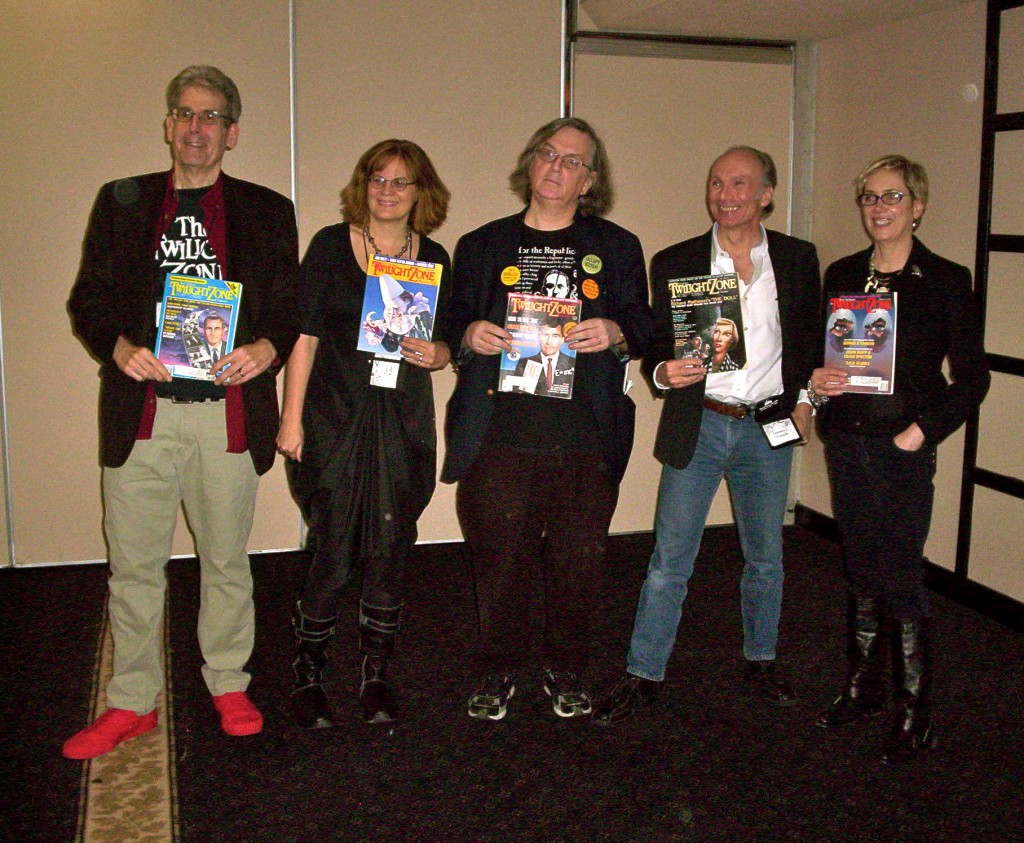
A "reunion" of writers published in the late, great, cherished TWILIGHT ZONE: Scott Edelman, Nancy Baker, Darrell Schweitzer, Lawrence C. Connolly, and Elizabeth Hand
A funny criticism of Twilight: “These vampires have been ‘alive’ for hundreds of years, and the best thing they can find to do is go to high school?!”
Last words of the last panel I heard at the con this year: “Buffy rules!”
One other highlight was something unlike the typical programming of a convention. When I saw that my writer-friend Patty Templeton (who kindly interviewed me last year for Black Gate and for the blog of the library she works at) was doing a reading, I put it onto my calendar. Patty read with a group of three other astoundingly talented writer/singer/artist/performer/instrumentalists who call themselves The Banjo Apocalypse Crinoline Troubadours. Specifically, they are: C. S. E. Cooney, Amal El-Mohtar, Caitlyn Paxson, and Patty Templeton. The room was packed to overflowing, even though the hotel staff made a last-minute change in the venue. And we the audience were blown away! These Troubadours baked cookies to pass among the listeners. They painted a backdrop to decorate the wall. They played a banjo on one song and a harp on another, and they sang their original songs in lovely, ethereal harmony. They read powerful, sophisticated selections of their fiction, each piece greatly different from the others, yet artfully balanced. Their work made me think, “Yeah! This is real fantasy writing!” They supported each other with chanted responses to key lines, like a Greek chorus. It awed me that they completely overspilled the confines of one medium and hit us with at least five different talents, each one of which could have made a complete show on its own, but all woven together. Really, they should all quit their day jobs and take the show on the road — it was that good! Yay, Claire, Amal, Caitlyn, and Patty! Hurrah, hurrah!
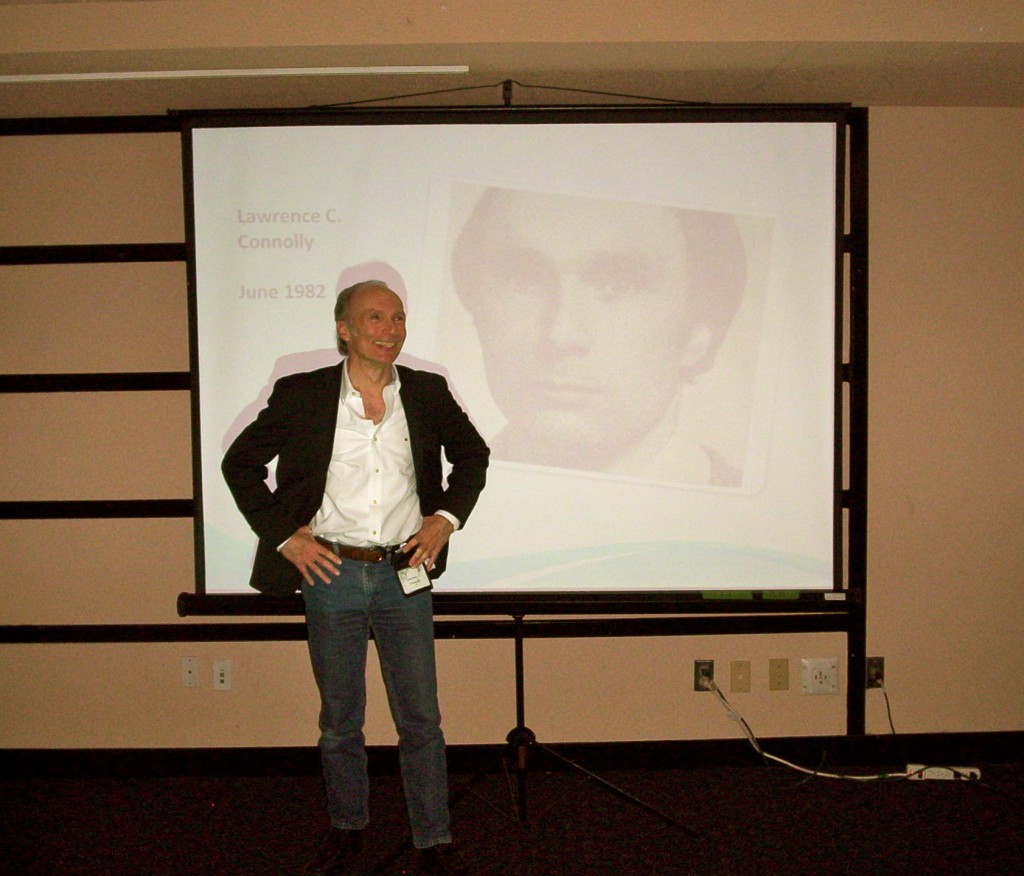
Mr. Lawrence C. Connolly, writer, musician, and instructor located not far from Pittsburgh; contributor to TWILIGHT ZONE
So, a great World Fantasy Convention, this one in 2012!
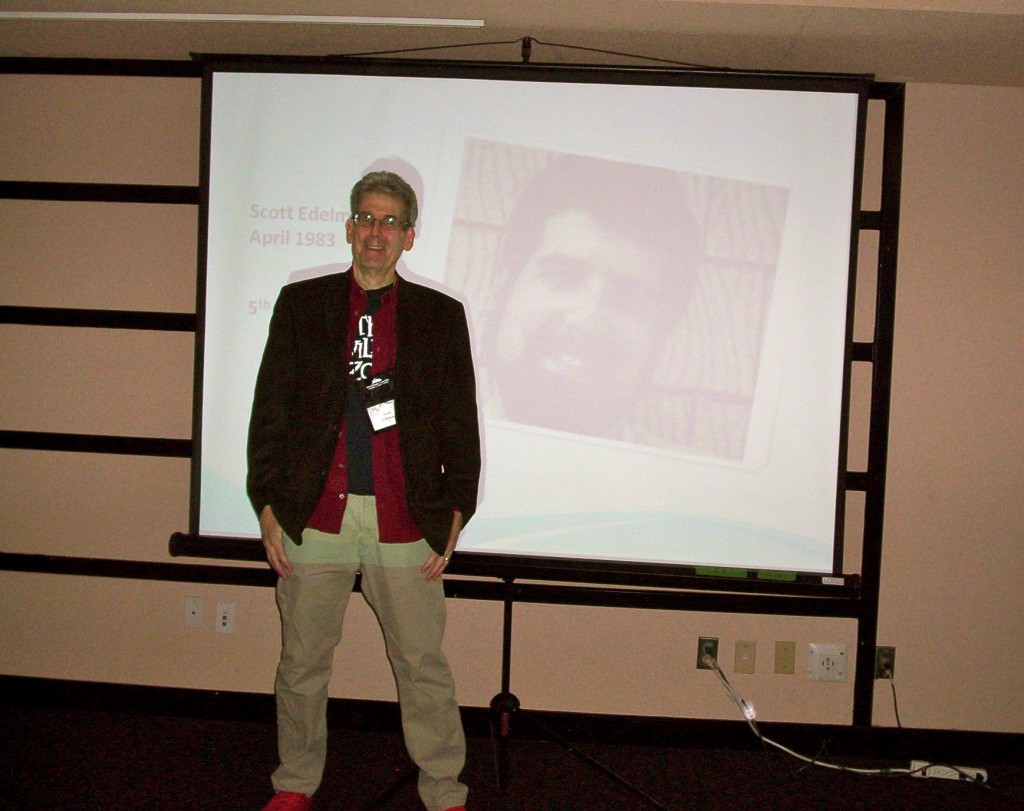
Scott Edelman -- See how this works? These are the TWILIGHT ZONE people then and now; their photos from when their stories appeared are projected on the screen behind them.
I had a very nice time at dinner Saturday evening with the literary agency that represents me. They kindly host such a dinner each year at World Fantasy for the clients who are attending. It was great to talk with older friends and to meet some of the new people who have just signed on. And it’s always wonderful to catch up with the people from the agency!
That’s just about it . . .
And this is it! We’ll close with this photo of this year’s Author Guest of Honour:
